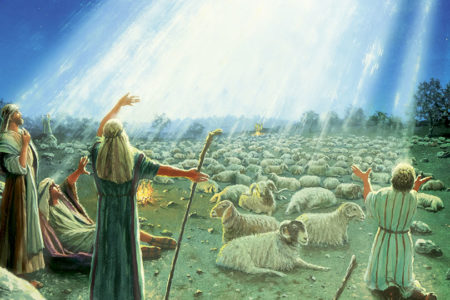Inside View Nov/Dec 2013
Every time I visit Israel, I see the modern miracle of the Jewish people. No other nation has ever been exiled and returned to its homeland to become a nation again.
First the Jewish people returned with Moses after 400 years in Egypt. Then God raised up Ezra, Zerubbabel, and Nehemiah to lead them back following the Assyrian and Babylonian exiles. The third rebirth came in May 1948, when the State of Israel was born following 1,900 years of dispersion.
The historically unique re-establishment of Israel should come as no surprise to us because God promised that unless the sun, moon, and stars disappear, the Jewish people will remain a nation (Jer. 31:35–36).
To traverse Israel today and see how this tiny country has developed into a modern society in merely 65 years is an amazing experience. Israel has a booming economy and is thriving when most countries are struggling. Certainly, it is far from perfect. Yet when I visit, I sense God’s hand at work, rebuilding the Jewish nation and protecting it from its enemies. Over the years, we have seen Israel’s remarkable victories against Goliath-sized odds. Israeli ingenuity leads the world in technology and science, and its humanitarian assistance is second to none.
Unfortunately, not everyone sees things this way. A friend told me recently he was disturbed to hear a dispensationalist say, “The modern nation of Israel has no prophetic significance.” This statement highlights the challenge we face in teaching future prophecy. How does one know when prophecy is being fulfilled? Dispensationalists don’t question Israel’s right to exist, but some doubt whether the modern nation is the one through which God will fulfill His prophecies. In other words, is it possible the Jewish nation could be exiled again?
In Isaiah 44:7, God says He is the One who appoints “the things that are coming and shall come.” Unfilled prophecy is part of God’s plan, and we are His witnesses (v. 8).
Modern Israel is a testimony to the faithfulness of God’s prophetic declaration, and we are witnesses to it. It is God who promised to bring the Jewish people home from the four corners of the earth where He scattered them (Isa. 11:11–12; Ezek. 20:33–38; 22:17–22; 36:22–24; Zeph. 2:1–2). These passages indicate they will return in unbelief.
Although Jewish people have lived in the land since the days of Joshua, the late 19th and the 20th centuries brought an influx from the Diaspora—from the four corners of the earth. When I travel around Israel, I hear Israelis speaking Russian, French, English, and the Ethiopian languages, for example, in addition to Hebrew.
Many future prophecies presume Israel’s presence in the land in unbelief. In Daniel 9, God says the “people of the prince who is to come shall destroy the city [Jerusalem] and the sanctuary [Temple]” (v. 26) and will “confirm a covenant” with Israel for seven years (v. 27). This will be a future covenant the Antichrist will make with Israel, promising peace and protection. Such a covenant cannot occur unless the Jewish people exist as a nation in their land.
Likewise, Ezekiel 38—39 presumes Israel is living safely in “unwalled villages” in the land (38:11) when Gog and Magog attack.
The evidence supports the understanding that modern Israel is a prophetic reality and that prophecy is unfolding before our eyes. I’m reminded of Jesus’ rebuke of the religious leaders of His day: “You know how to discern the face of the sky, but you cannot discern the signs of the times” (Mt. 16:3). He spoke of His presence being the fulfillment of God’s Messianic prophecy, but the religious leaders would not accept it.
I believe God is doing His masterwork right before our eyes through the rebirth and building of the modern nation of Israel. It is a prelude to the time when He will turn His attention back to His Chosen People in order to bring honor and glory to His name (Ezek. 36:16–38).
Modern Israel is prophetically significant; and when we see the Lord’s hand at work, fulfilling what He prophesied, we should discern it and testify to His mighty works.






